Such an honor to have my new album "Present Time" named by DownBeat Magazine as a Best Album of 2016 giving it 4 1/2 stars. "Present Time" is available now @Bandcamp as well as Amazon & iTunes
Trombonist Reggie Watkins has released his newest album and brought Matt Parker on board to produce the album with him. The CD, Avid Admirer: The Jimmy Knepper Project, will be released on Matt Parker's BYNK Records on July 13.
This album features
Reggie Watkins - trombone
Matt Parker - soprano and tenor saxophone
Orrin Evan - piano
Tuomo Uusitalo - piano
Steve Whipple - bass
Reggie Quinerly - drums
Present Time (Bynk Records)
Matt Parker Trio
Matt Parker’s second release sees the saxophonist from several different angles.
On one hand, the Fort Lauderdale, Florida native can solo as if from an earlier era – big scoops, stratospheric altissimo notes and a wide vibrato adorn wailing, bluesy lines. Parker’s tenor playing on the first track of the album certainly falls into that category.
But jump one more piece in, and another side of the musician is revealed entirely. This time on soprano, New Horizons joins Parker and drummer Reggie Quinerly, who attended the New School in New York with the saxophonist, in an intense duet. An interesting, through-composed piece whose themes develop over time, the song doesn’t introduce bassist and former fellow New School student Alan Hampton until more than halfway through.
Vocalist Emily Braden expands the ensemble on Winter’s Gone, where she initially sings a wordless rendition of the melody accompanied only by Parker’s tenor. Later, Braden delivers a soulful, bluesy take of I’m Confessing That I Love You and also adds her voice to the odd-metered title track near the record’s conclusion. These vocal excursions do wonders to break up the trio tunes and vary the pace.
Two other takes are of particular note, one for historical reasons and the other for its sheer energy. Previously unrecorded until now, Charles Mingus’ Song To Keki makes its first appearance on this record. Opening with a casually swinging melody, the tune builds momentum until Parker’s tenor seems like it will come apart in his hands.
On The Gong, the saxophonist is alone with only his saxophones and the titular percussion instrument. Parker goes about this (probably) free improvisation with a sense of drama and power, at one point breaking out a primal yell before unleashing a barrage of multiphonics on his tenor. In a nod to Rahsaan Roland Kirk, the track ends with Parker playing both soprano and tenor simultaneously.
Of course, things ultimately aren’t as black-and-white as I’ve made them seem. The many sides of Parker pop up regardless of the piece, and his improvisations always draw from a large pool of influences. However, it’s this overall compositional and improvisational contrast that keeps catching the listener by surprise throughout the record. Combined with the album’s numerous fresh ideas and interesting takes on tested formulas, this is certainly one to check out.
by: CHRIS MASKELL
published June 17th 2016
Matt Parker, Present Time (BYNK) – I’m pretty sure Parker can do anything. For his second release he swings his ass off, goes a little out, nods to the minimalist gestures that folks like Colin Stetson have turned to, and backs vocalist Emily Braden on a slamming version of “I’m Confessin’ (that I love you).” A big burly sound and the merging of a whole lot of different frameworks, ideas, and concepts into a singular voice makes Parker an impressive player, composer, and bandleader.
- Outside-Inside-Out by Chris Robinson
The sounds and styles of the great tenor masters are echoed within the music of saxophonist Matt Parker. On “Noah’s Arc”, the opening track of his new album “Present Time”, he evokes the loose swing of early-1960s Sonny Rollins, but just as the listener gets comfortable, Parker morphs into araunchy tenor style reminiscent of both Jr. Parker and Albert Ayler. And while the influences of John Coltrane, Roland Kirk, Don Byas, Ornette Coleman, Charlie Parker and Lester Young all appear through this album, Parker maintains his own identity through gradations of tone and his personal improvisational style. He has learned well from the masters: his compositions are concisely written and offer plenty of flexibility for solos; his improvisations embrace complexity without alienating the listener; and he knows how to play behind a singer—in this case the supremely talented Emily Braden, who guests on three tracks. Parker’s band mates, bassist Alan Hampton and drummerReggie Quinerly display the same broad knowledge of jazz history as the leader, providing a funky down-home feeling for Braden’s feature on “I’m Confessin’ That I Love You”, a Coltrane-inspired free groove on “New Horizons”, as well as the necessary mixture of straight-ahead and free required for the previously unrecorded Charles Mingus composition “Song to Keki”. The most unusual track is “The Gong”, a solo piece that Parker created on the spot after finding a large gong hanging in the recording studio. Parker plays both tenor and soprano (separately and together) between deep hits on the gong. The album concludes with a romping Second Line strut, “Sixteen”, a piece that Parker wrote shortly after a summer gig he played as a teenager with a New Orleans café band. The infectious joy that comes through every beat of this track makes it a perfect ending for the album, which amply showcases its abundantly talented musicians without taking itself too seriously.
by Thomas Cunniffe
I don’t select a Best New Artist every year like they do at the Grammies, but if I were to do that, Matt Parker would have easily taken the prize in 2013 for his standout debut album Worlds Put Together. The tenor sax maestro strikes me as a Joe Lovano with the gumption of Rahsaan Roland Kirk or Eric Dolphy, a fun combination of qualities that is so mindful of the jazz saxophone’s soulful past while giving in to impulse, an oft-forgotten tenant of what jazz is about, too.
For Present Time (February 12, 2016 by Bynk Records), Parker puts his horn into even sharper focus by paring down his band to just the rhythm section of Alan Hampton (bass) and Reggie Quinerly (drums). It means that every note blown by Parker carries a heavier load and the revelation of Present Time is that he can not only handle it, he shines brighter as the spotlight gets hotter.
Part of the secret to delivering when there’s no one there behind him handling the chord changes is being more personable in the delivery. Parker doesn’t fuss over whether he’s leaving behind too many notes or too few, as long as they carry out the right passion. No where can that be more evident than on blues numbers like “Noah’s Arc” and here he conjures up Coleman Hawkins in a particularly gruff mood. Contrast that with the cheerfulness of “Present Time,” a throwback melody played over Quinerly’s modern, almost drum ‘n’ bass beat that vacillates between 7/8 and 7/4.
Parker is fond of stretching out toward avant-garde while maintaining a connection to tradition, as “New Horizons” makes clear. His wailing notes on soprano sax with an improvising Quinerly beside him is mindful of Coltrane/Ali’s Interstellar Space except that Parker is too melodically inclined to let it get that far outside. Halfway in he ushers in a new figure with Hampton, and pours out fills of trills with Hampton pulling out the bow. He goes without any accompaniment at all for “The Gong,” making exhortations first on soprano and then tenor sax (sounding as brawny as a baritone) punctuated by strikes to a gong. On his final note, he blows through both horns in a nod to Kirk.
Parker showcases his facility for playing alongside a vocalist on a handful of songs performed with Emily Braden. Most of her performances are wordless, assuming a co-lead part that supplements Parker, but for the standard “I’m Confession’ (That I Love You)” she sings the lyrics while Parker goes into Lester Young mode. He proves to be a fine accompanist behind Braden, acting almost as a harmonizing voice, and amps up the energy level a notch for his solo turn.
The only other non-original is a Charles Mingus composition that has never been fully recorded. “Song To Keki” is a pretty reading of Mingus’ melody, but when he enters the solo portion he flies off into orbit, returning still feelin’ jaunty and improvising like no one in particular.
The days when a teenaged Parker was just getting started playing in New Orleans are alluded to in the second line pulse of “Sixteen,” with Jerome Jennings (Sonny Rollins, Christian McBride) adding tambourine. Parker cuts loose on tenor in a funky aside that surely would have filled up his saxophone case on a French Quarter street corner. It’s a nice and tidy wrap up of the whole album.
Present Time confirms the resourcefulness and playfulness of Matt Parker’s saxophone that’s so engaging and so lively. These are qualities that shine through whether he’s playing in an orchestra, sextet or this trio. Show me someone who says jazz is no fun to listen to and I’ll show them Matt Parker.
On saxophone, Parker seems to enjoy speeding through a song just to see what happens when he jerks on the steering wheel and makes the tires spin out. Two albums into his recording career, it would appear that his bandmates enjoy the ride, because on his sophomore recording, a trio session this time around, there’s as much wildness as on his fun debut Worlds Put Together. But Parker is more than just careening through space. Opening track “Noah’s Arc” bops right along with the heart of an old-schooler. Three vocal tracks are a nice addition, too, both in support of lyricism and also to shift the pressure on the gas pedal. Parker’s trio consists of other This Is Jazz Today members past, Reggie Quinerly (drums) and Alan Hampton (bass).
- Bird is the Worm
Photo by Mark Shelby
By Zoe Leverant
Tenor and soprano sax whiz Matt Parker celebrates his second album Present Time (out February 12) at this show featuring the pared-down trio that recorded the LP. It’s tempting to describe Parker’s style as noodling — he revels in the same masterful but easygoing playfulness that makes a great guitar solo. But he moves easily between styles, equally comfortable exploring the limits of free jazz or faithfully evoking a New Orleans second line. The pair that backs him up—bassist Alan Hampton and drummer Reggie Quinerly—are well-versed in supporting his genre-hopping style, which makes sense, since the three spent their undergrad together at the New School. Adding a special touch to this performance are Michael Arthur, a Brooklyn artist who draws nightlife, and vocalist Emily Braden.
The New York City Jazz Record is one of the most important NYC publications for a jazz enthusiast.









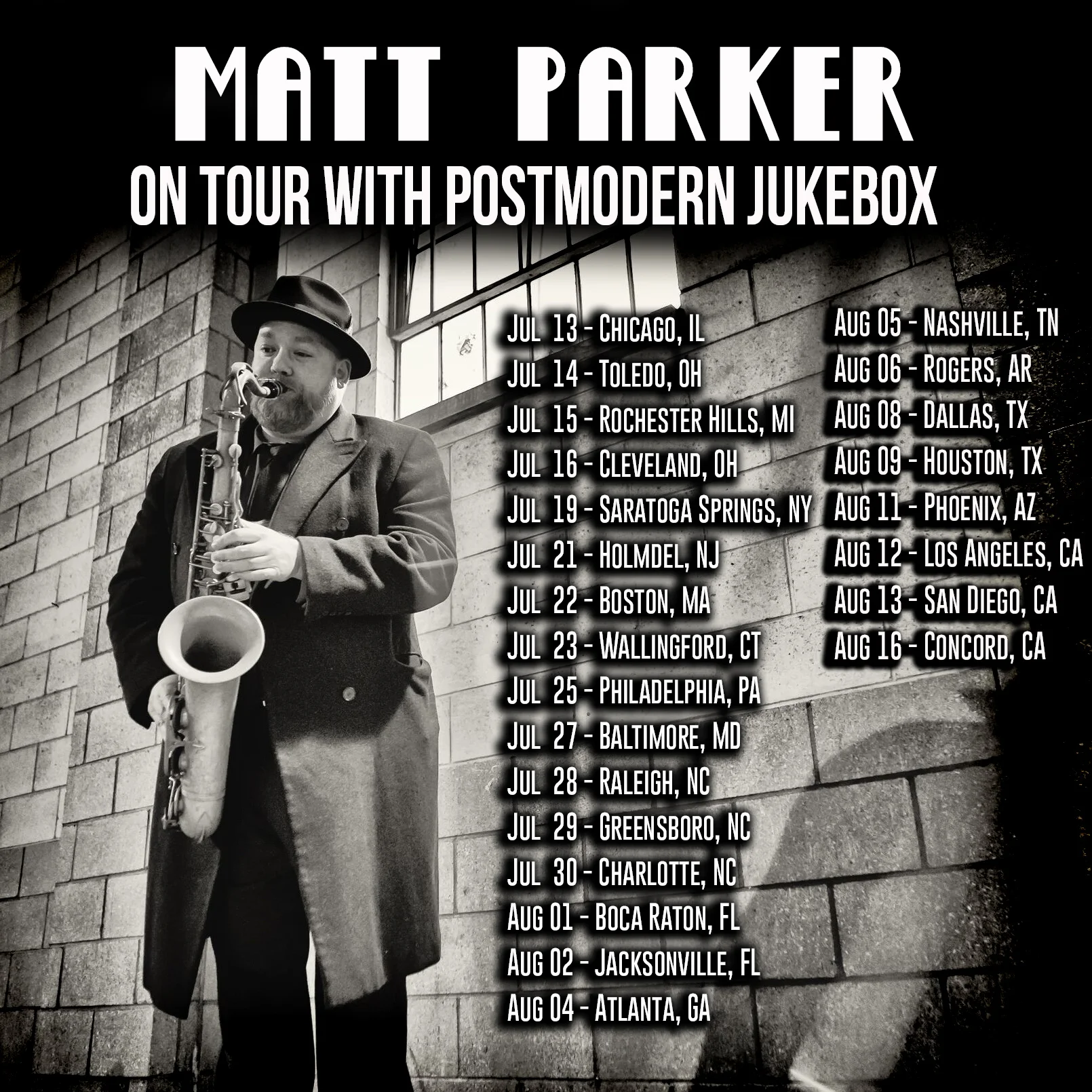





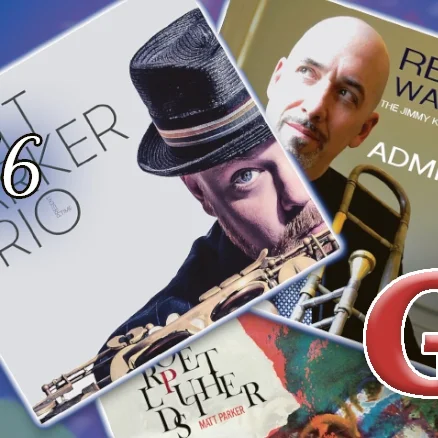




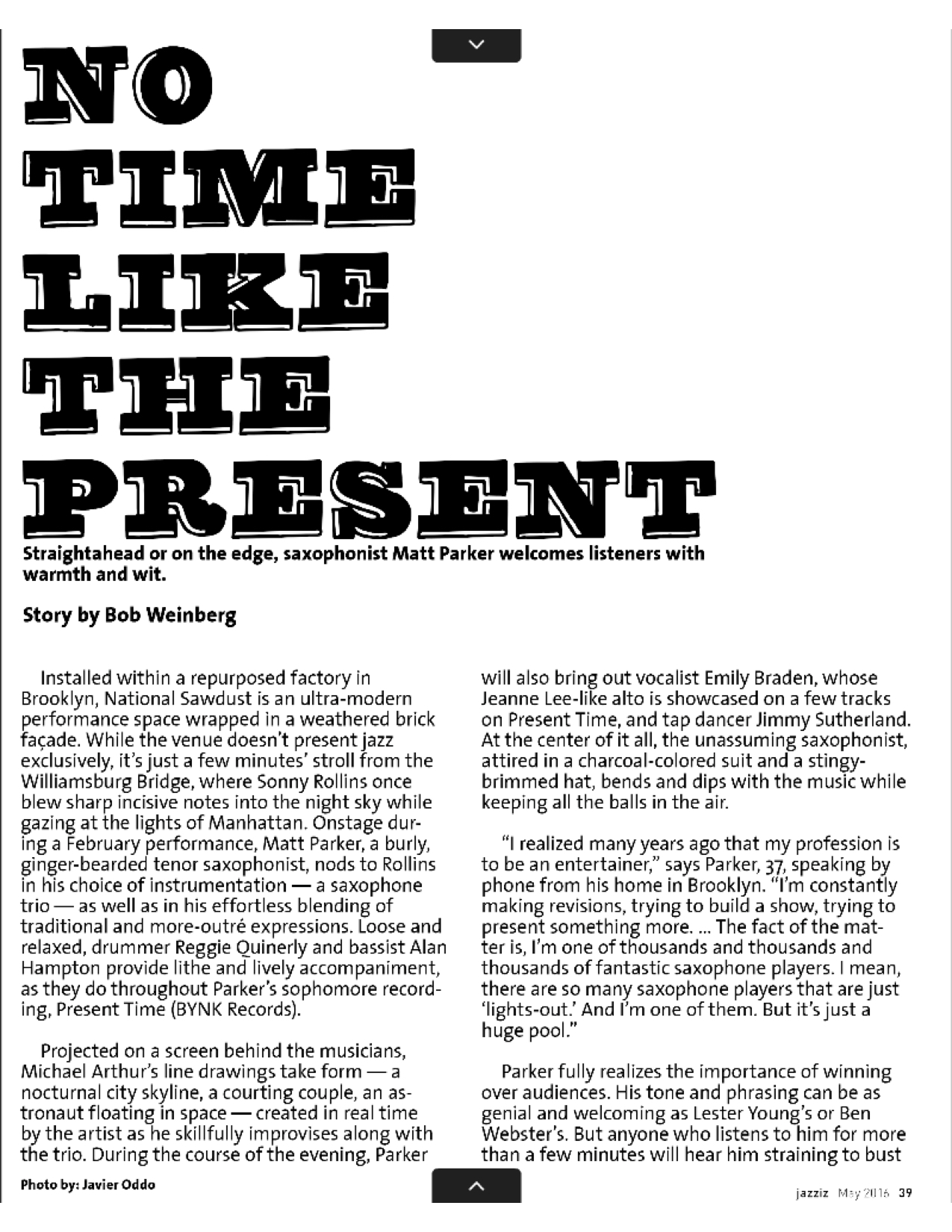



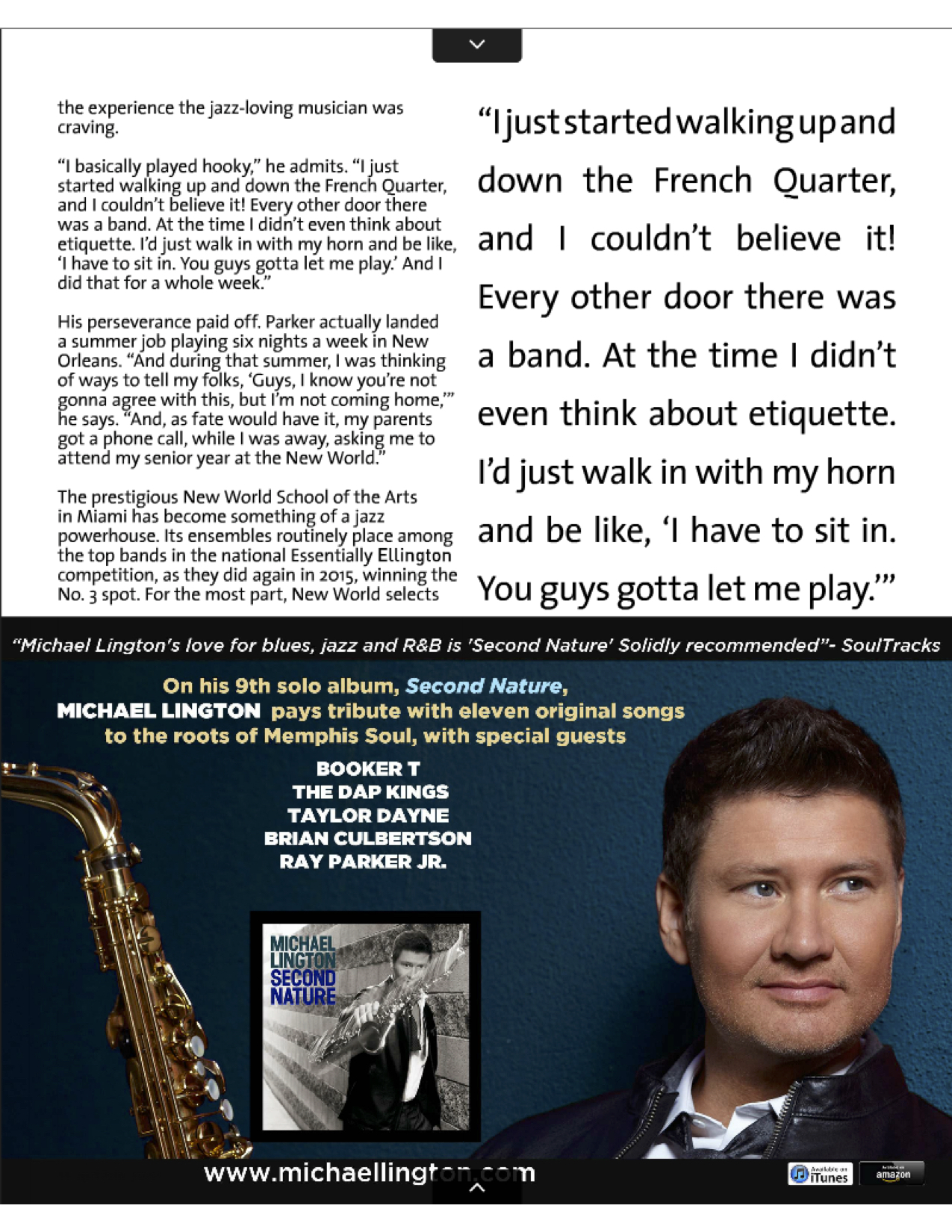


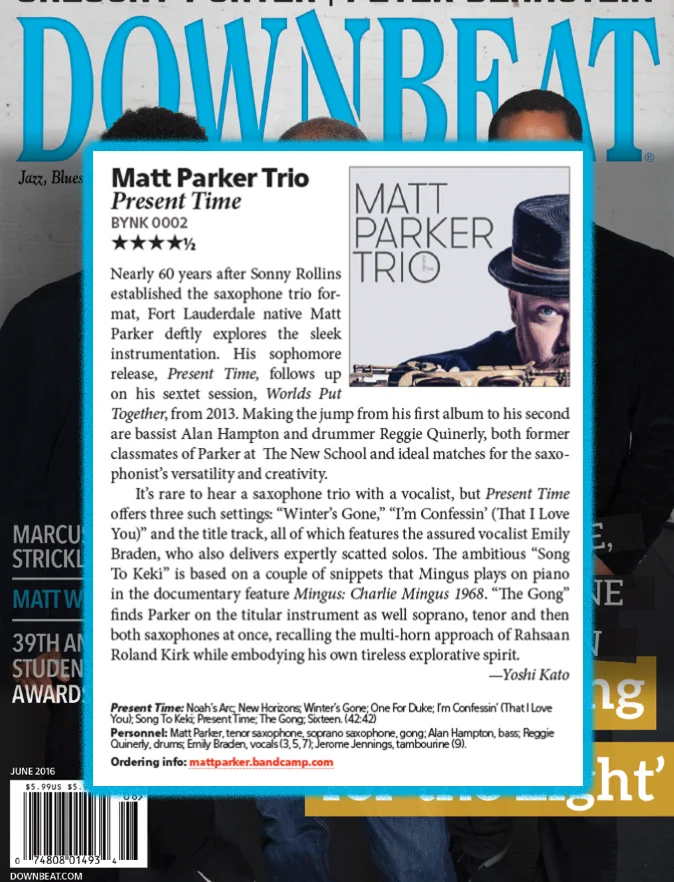







Such an honor to have my new album "Present Time" named by DownBeat Magazine as a Best Album of 2016 giving it ★★★★1/2 STARS